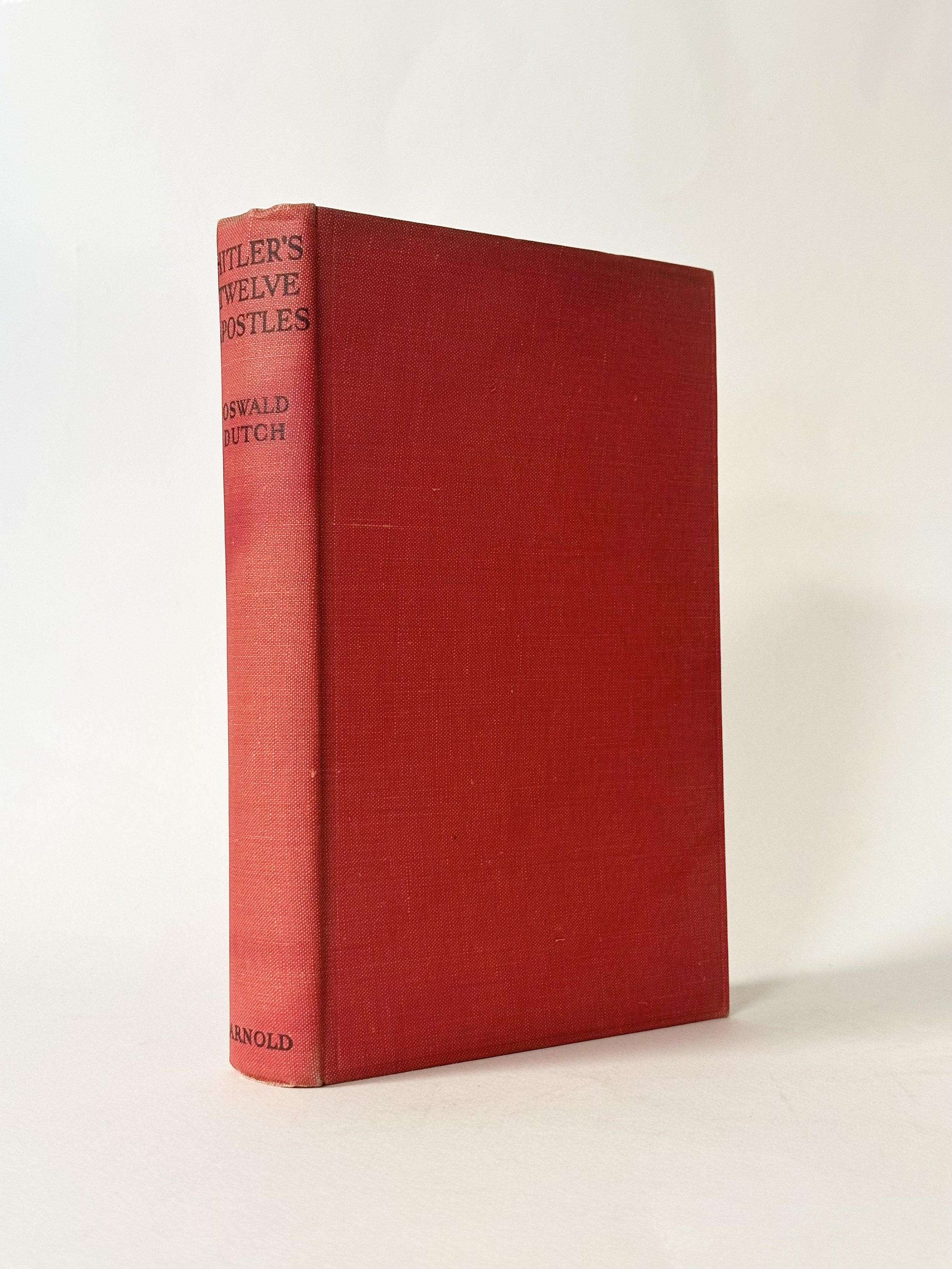 Image 1 of 3
Image 1 of 3

 Image 2 of 3
Image 2 of 3

 Image 3 of 3
Image 3 of 3




DUTCH, Oswald. Hitler's Twelve Apostles
DUTCH, Oswald. Hitler's Twelve Apostles. London: Edward Arnold. 1939. 8vo. First edition. Publisher’s red cloth lettered in black to the spine, in the striking dust jacket depicting the titular apostles. A very good example, the cloth clean though a touch discoloured at the spine, very minor, with the extremities gently bumped. The binding remains tight and square, with twelve photographic plates of the circle, all present, and the contents usually fine but for some patchy toning to endpapers and prelims. The dust jacket priced 10/6 net, complete, with some shallow chips and nicks to the spine head and tail, and around corners, and a couple of closed tears also. But still a very presentable copy.
An important book by Oswald Dutch—a pen-name for Otto Erich Deutsch—an open opponent of National Socialism and early forewarner of Hitler’s rise to power. Dutch was born in Austria and fled after the Anschluss of his homeland, first to Switzerland and then to Britain where he lived until his death, working with the BBC among other news agencies. This is his third published book on the Third Reich, assessing the twelve most influential members of the Nazi party, the so-called apostles—Heinrich Himmler, Hermann Goering, Rudolf Hess, Joseph Goebbels, Baldur von Schirach, Wilhelm Frick, Julius Streicher, Walther Funk, Robert Ley, Joachim von Ribbentrop, Walther von Brauchitsch, and Alfred Rosenberg. Dutch’s argument—contemporarily contrary and historiographically correct—was that Hitler allowed each of these apostles a certain autonomy most unlike a ‘usual’ dictatorship. Indeed, Dutch suggests many decisions and policies could and would be determined and actioned outside of the realm of the party’s inner sanctum, by way of open secrets or indeed genuine lack of knowledge—this was, after all, an organisation seeking to revolutionise its own country, rewrite its cultural DNA, annihilate an international religion, destroy multiple political movements and belief systems, implement social and economic advancements beyond which no country had successfully undergone, and indoctrinate by re-education, propaganda and fear every citizen current and future, all while fighting a war in Europe and beyond on two fronts. A scarce and important work.
DUTCH, Oswald. Hitler's Twelve Apostles. London: Edward Arnold. 1939. 8vo. First edition. Publisher’s red cloth lettered in black to the spine, in the striking dust jacket depicting the titular apostles. A very good example, the cloth clean though a touch discoloured at the spine, very minor, with the extremities gently bumped. The binding remains tight and square, with twelve photographic plates of the circle, all present, and the contents usually fine but for some patchy toning to endpapers and prelims. The dust jacket priced 10/6 net, complete, with some shallow chips and nicks to the spine head and tail, and around corners, and a couple of closed tears also. But still a very presentable copy.
An important book by Oswald Dutch—a pen-name for Otto Erich Deutsch—an open opponent of National Socialism and early forewarner of Hitler’s rise to power. Dutch was born in Austria and fled after the Anschluss of his homeland, first to Switzerland and then to Britain where he lived until his death, working with the BBC among other news agencies. This is his third published book on the Third Reich, assessing the twelve most influential members of the Nazi party, the so-called apostles—Heinrich Himmler, Hermann Goering, Rudolf Hess, Joseph Goebbels, Baldur von Schirach, Wilhelm Frick, Julius Streicher, Walther Funk, Robert Ley, Joachim von Ribbentrop, Walther von Brauchitsch, and Alfred Rosenberg. Dutch’s argument—contemporarily contrary and historiographically correct—was that Hitler allowed each of these apostles a certain autonomy most unlike a ‘usual’ dictatorship. Indeed, Dutch suggests many decisions and policies could and would be determined and actioned outside of the realm of the party’s inner sanctum, by way of open secrets or indeed genuine lack of knowledge—this was, after all, an organisation seeking to revolutionise its own country, rewrite its cultural DNA, annihilate an international religion, destroy multiple political movements and belief systems, implement social and economic advancements beyond which no country had successfully undergone, and indoctrinate by re-education, propaganda and fear every citizen current and future, all while fighting a war in Europe and beyond on two fronts. A scarce and important work.
